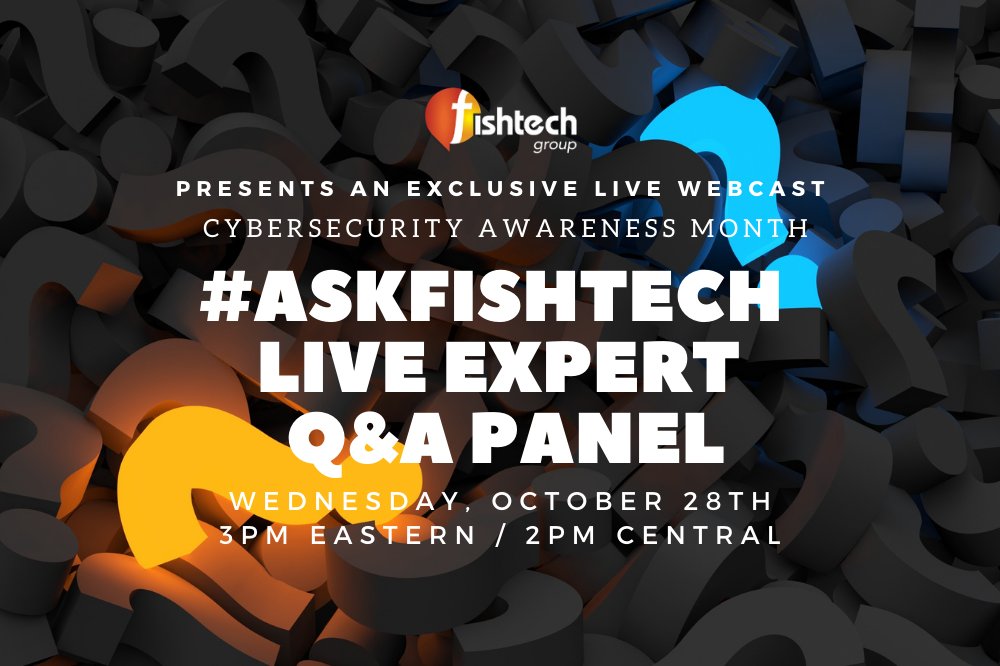Newsroom

#AskFishtech Cybersecurity Awareness Month
growthzone
October 26, 2020
Register for this rare opportunity to ask Cybersecurity execs your burning questions here!
Q: Aside from it being Cybersecurity Awareness Month, can you speak to the importance of creating an accessible conversation around Cybersecurity?
When it comes to cybersecurity, even with all the incredible technology today, the weakest link is still people. The least-informed staffer, or most compromised insider, has an email address. That's why we believe that every institution has an imperative to educate their constituents on cybersecurity. And, to be effective, cybersecurity training should be accessible and consistent. This national month dedicated to cybersecurity is a great example of consistent education outreach and we want to amplify it from our platform.
What audience was the executive Q&A created for?
This Q&A is designed for a broader audience than our usual corporate executives because anyone can benefit from this knowledge. Anyone from potential Fishtech customers, to small business owners, to young people interested in a cyber career, to individuals working from home during the time of Covid.
What else can we expect from Fishtech Group throughout Cybersecurity Awareness Month?
Throughout October, we will be focusing on many areas of cybersecurity during Cybersecurity Awareness Month. Stay tuned to our blog and our social media channels for blogs, videos, infographics, and more so that we can all do our part and #BeCyberSmart. Each week we've focused on the national theme and contributed our unique take on it. This week we're focused on securing internet-connected devices in healthcare.
If You Connect It, Protect It was the first week's focus. The line between our online and offline lives is indistinguishable. This network of connections creates both opportunities and challenges for individuals and organizations across the globe. Our goal was to highlight the ways in which internet-connected devices have impacted our lives and to empower all users to own their role in security by taking steps to reduce their risks.
We don't want to ruin the surprise, but what are some common themes around questions you've received for the panel so far?
We've had a good response with almost 20 questions in so far. Common themes range from general cybersecurity to security risks of a totally remote workforce, to best practices for securing home and school networks, to cybersecurity careers, to enhancing Identity and Access Management programs. And how Fishtech got its name.
Why do you believe it's important to #BeCyberSmart and who does that phrase apply to besides corporate cybersecurity teams?
As organizations increasingly move their assets to the cloud, cybercrime has continued to mature, and the prominence of cyberattacks has grown. Unfortunately, many companies' security practices are lagging from an organizational standpoint. And every employee must be cyber smart for the practices to work; now that more people than ever are working from home, while their kids are online schooling right next to them, it's imperative to pay attention to cybersecurity.
Let’s face it, cybersecurity isn’t always the flashiest part of an organization, nor is it viewed as a revenue generator, which often means it becomes an afterthought to businesses with growth on their minds. Fortunately, many organizations are quickly realizing the truth: the lost time, effort, and money spent fighting trench warfare battles with malicious actors using outdated technology is a much greater growth risk than the upfront cost of ensuring that the solutions are in place.
The choice is clear – prepare wisely and allow your teams to devote their energy into building your business, or fail to plan and risk everything fighting an uphill battle.
Our resolve to help lead organizations to a more secure future has never been stronger. Cybersecurity should not be an afterthought, especially in 2020.
What does it mean to #BeCyberSmart?
#BeCyberSmart’ is a call to action for individuals to own their role in protecting their part of cyberspace. We each have a role to play in making sure we protect our own devices to ensure the broader security of the individuals of the organizations we are a part of.
